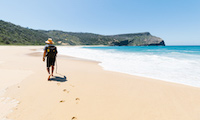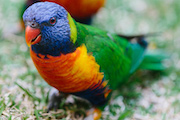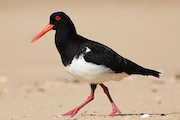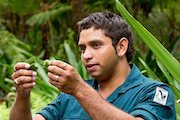Boating, fishing & water safety
For assistance, call the Visitor Centre on 1800 357 823.
In an emergency call Triple Zero (000).
We remind visitors to be aware of water-related risks within the national park and take responsibility for your own safety and those in your care.
Water safety
Whether you are swimming, snorkelling, diving, paddleboarding, canoeing or fishing at Booderee National Park, be safe. Take care of yourself and those around you, while also being aware of your environment.
As the beaches are not patrolled in Booderee National Park, they do not have lifeguards, nor do they have flags to indicate where it is safest to enter the water. Swimming, snorkelling, diving, or fishing is undertaken at your own risk. Please read and remember the following messages to remain safe during your visit to Booderee.
- Always read and follow park signs and information – safety directions are provided for your safety.
- Keep children within arms' reach at all times when in or around water.
- Never swim, snorkel, dive or fish alone – always go with another person.
- Only swim during daylight hours.
- Be aware of ocean currents, check the water depth and know your limits in the water.
- Ensure you have the correct equipment for the activity you are doing by completing the Safety Link Waterways & Safety Equipment checklist
- Be alert to changes in the weather, as ocean and creek conditions can change rapidly and become dangerous; currents can shift; water levels can rise very quickly.
- Maintain an awareness of marine stingers and do not touch or pick up marine animals.
Boat safety
Whether you have a kayak, personal watercraft, sailboat, or power boat, it’s important that you know and understand the rules that apply to your mode of transport, as well as have the right equipment to be responsible and safe on our waterways:
- It’s important to tell someone where you’re going, how many people are on board, your vessel details and when you will return.
- Check the marine and ocean weather forecast, tidal information and wave report before heading out to make sure it is safe to be on the water and that you have an enjoyable experience.
- Adhere to the Boating Handbook and rules of your licence type, including the Safety and rules on NSW waterways.
- Remember that boats must observe appropriate distances between other vessels and marine mammals.
- Wear a life jacket at all times while boating.
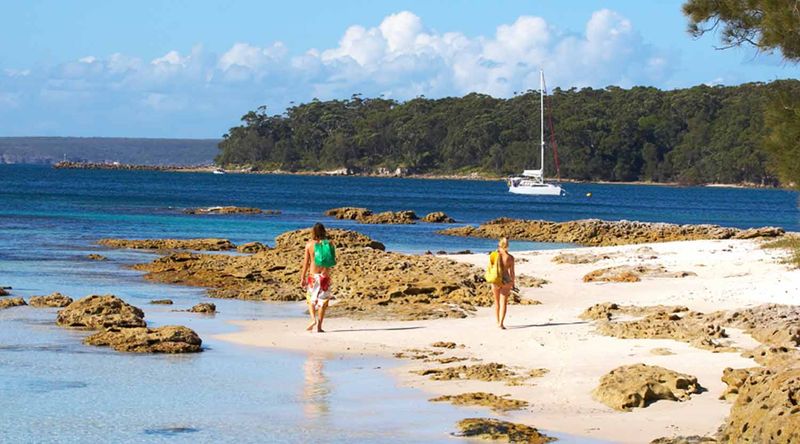
Fishing
As a national park, some restrictions on fishing apply in Booderee National Park.
- Check for hazards and choose a safer place to fish.
- Never fish by yourself – tell someone where you are.
- Carry a mobile phone with you.
- Never turn your back on the sea or ocean.
- Always spend time watching the conditions before fishing, and scan for changing conditions. Observe first, fish later.
- Note the location of and access to life buoys where they are present.
- Learn how to swim.
- Plan an escape route in case you're washed in.
- Don't put yourself at risk if someone else is washed into the water.
- If you're in doubt, don’t go out.
Rock fishing
Rock fishing at Booderee National Park is extremely dangerous and fatalities have occurred due to this activity. Rock fishing at Booderee National Park is undertaken at your own risk.
If you choose to participate in rock fishing, in addition to the points above, adhering to the following may help save your life:
- Wear a lifejacket. A lifejacket significantly increases your chance of survival if you are washed into the water. It's NSW law to wear a lifejacket when rock fishing and fines apply.
- Know the tide and weather. Check the marine and ocean weather forecast, tidal information and wave report, and if conditions look dangerous, do not fish. Go to a different location or come back another day.
- If conditions worsen find a calmer, more sheltered spot — or go home.
- Fish only in places you know are safe.
- Wear the right gear — rock fishing shoes with cleats or spiked boots.
- Carry a rope and float with you.
- Do not fish by yourself. If someone is washed in, one person can stay and help while the other alerts emergency services (dial 000).
Visit the NSW Department of Primary Industries website for more tips on Fishing Safely.
Paddle board
Before entering the water with your paddle board be properly prepared. This includes checking the weather and tides, as a gentle on shore breeze can be deceptive as the wind becomes stronger the further out into the ocean you are.
If possible, go paddle boarding with a friend, it’s more fun and safer, otherwise make sure to tell someone where you’re going and when you’ll be back. Ensure your phone is fully charged and stored in a waterproof pouch (which can be found in sports shops and on-line), so you can call 000 for help if need.
Wear a Personal Flotation Device (PFD) especially if you are not a confident swimmer or a beginner paddle boarder. Not all life vests are bulky, and they will help afloat if you to remain afloat should you become separated from your board. To keep connected to your board, make sure to wear your quick release leg strap.
While on the water:
- maintain visibility of your surroundings. Keep and an eye on everyone and everything.
- stay close to your paddling group and be aware of surrounding vessels, which can include other paddlers, rowing skull, jet skis and larger powered watercraft
- when passing other craft, keep to the starboard side (right-hand) of the channel.
Stay in touch
Subscribe to receive important updates about Booderee National Park.

